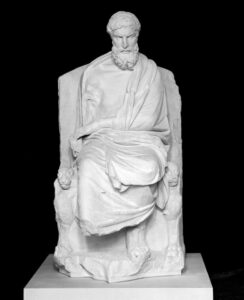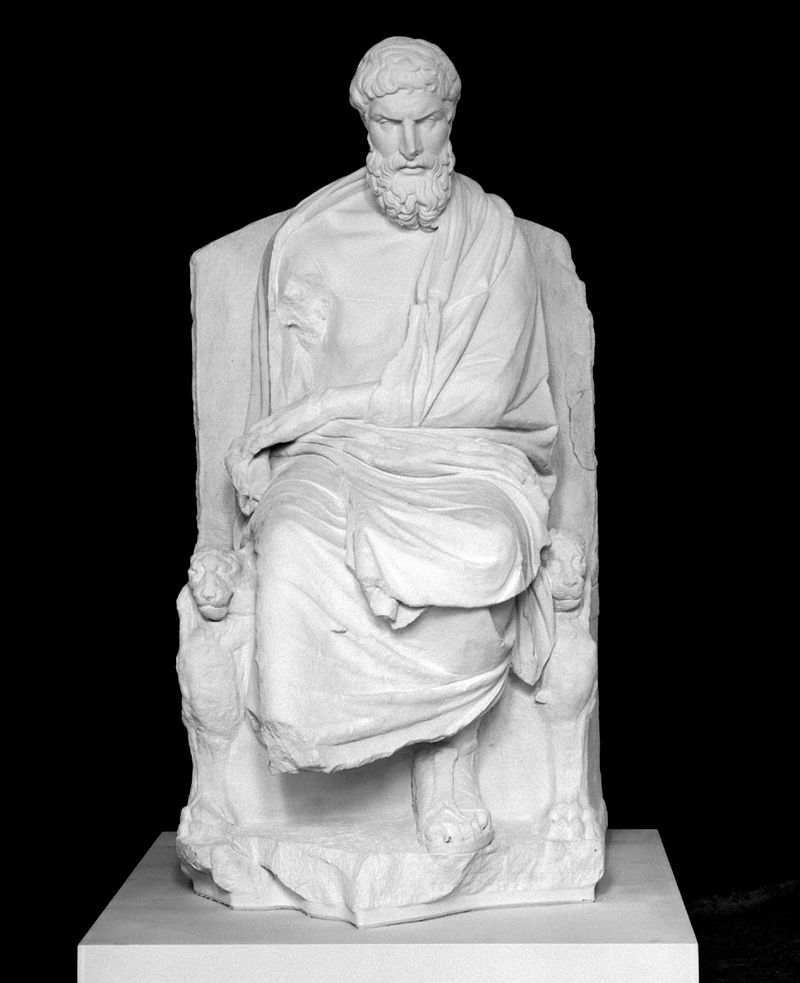Even though Epicurus lived more than 2,000 years ago (from 341 to 270 BCE), the philosophy he founded in still misunderstood. Much of this unfortunate state of affairs can be traced to other authors from ancient times, especially Cicero and Plutarch, who deliberately distorted Epicurean philosophy for their own purposes. This book, Epicurean Political Philosophy, is a major corrective; Bloomsbury should be especially congratulated for publishing it.
We owe the groundbreaking analysis of Epicurean life presented here to two professors of philosophy in Chile: Javier Aoiz is at the University of Santiago; Marcelo D. Boeri is at the Pontifical Catholic University of Chile. Together they have established a new framework for understanding what the Epicurean project was all about.
In his treatment of Epicureanism, Plutarch omits any mention of security, justice and law. According to Aoiz & Boeri, “Security is the key concept for analysing how Epicureanism understands itself concerning both the genealogy of justice and law and of irrational fears and unrealistic desires.” They observe that this illuminates “…the observance of necessary natural desires, friendship and philanthropy, with the way of life made possible by political communities.”
The relationship Epicureans had with political life is the main thrust of the book, but before I get to that we must look more closely at the issue of security – they devote an entire chapter to it. They state quite directly that “Security is one of the main doctrinal issues of Epicureanism.” But Epicurus realized security had its limits. Civil war is a direct threat to the security of the polis (city-state), but so is plague. We all found with the COVID outbreak what Epicurus and Lucretius (the Epicurean poet) knew all too well: “one can attain security against many things, but when it comes to death, all men live in a city without walls.”
As the authors explain, “The life of the Epicureans requires the security provided by ‘contractual’ justice, but also promotes the reduction of the causes of harm.” While justice can often mitigate harm, the Epicureans were no fools: they also recognized a good reputation, wealth and proximity to power could minimize harm. Philanthropy was another avenue they pursued, even though Plutarch “accused Epicurus of being incapable of philanthropy.” Thus, Epicurus also looked at security from a higher vantage point than the mere physical; he put forward what the authors here describe as “the purest security.” This was put into words by Lucretius: “Nothing is more blissful than to occupy the heights effectively fortified by the teaching of the wise.”
The authors also delve into the mostly lost works of a pupil of Epicurus. Colotes (who lived from 320 to about 267 BCE) “does not exalt security, tranquillity and the release from disturbances as achievements leading to other higher ends belonging to the polis.” The authors wonder if the achievements of the polis which Colotes praises are the desirable status of human life, or a necessary condition for other modes of full security. This leads them to an important insight.
“Epicureanism is inclined towards the latter, as Epicurean ‘physiology’ aims at providing ‘modes of full security’ This means that Epicurean philosophy understands itself as a curious historical phenomenon.” It both recognizes security provided by the polis as necessary, but, on the other hand, “it attributes to the polis the promotion of vain fears and limitless desires that it seeks to dissipate through physiology to attain the state of Epicurean security.” While the authors could have been more clear as to what is meant by physiology in this section, the main thrust of their argument is that both security (and it’s flip side, fear) corresponds to the dual understanding that both natural and unnatural desires are inherent in human beings.
They do, later in the book, explicitly discuss physiology, one of whose purposes “is to achieve what Epicurus calls a ‘firm contemplation’ that discriminates and hierarchizes desires while explaining and dispelling those that have their origin in fears and vain opinions.” They draw attention to the fact that neither Cicero nor Plutarch mention the role of physiology in the motivations of the Epicurean sage. “They are obliged to do so,” the authors state in no uncertain terms, “because of their malicious identification of the Epicurean way of life with a life of enjoyment.”
They specifically push back with grimacing satire on not what only Cicero and Plutarch wrote, but on the widespread acceptance of their writings based solely on their fame. The Epicurean life was sustained over a period of some 500 years. “To reduce the behaviour of those who cultivated Epicureanism over several centuries to a single pattern is a polemical strategy that involves much historical levity.”
Both ancient writers most notoriously stated that Epicureans were disinterested in politics. This book shows that many served as advisers to kings, diplomats, priests of the imperial and local cults, and even as prophets. Even Epictetus, in an attempt to portray Epicureans as antithetical to human sociability, lets slip that Epicurus did perform activities related to political life.
The authors of this book make a very strong statement here. “Cicero and Plutarch absolutize the slogan ‘do not participate in politics’ as a principle of conduct of the Epicureans, but they do not dedicate a single line to the specification of which text of Epicurus it comes from and what its original context was.”
This leads us back to justice. The authors maintain that, based on the way interpersonal relations were conceived of in the ancient world, friendship is an essential cause of justice. Friendship is exalted in several Epicurean texts, most notably this one: “Friendship dances around the world announcing to all of us that we must wake up to blessedness.” This, of course, flies in the face of the two famous slogans attributed to Epicureans: ‘live unnoticed’ and ‘do not participate in politics.’ Lucretian verses make it clear that pacts between neighbours give rise to justice. “Additional proof of this,” write Aoiz & Boeri, “is provided by its concordance with a thesis on the genealogy of justice and the laws by Epicurus’ successor, Hermarchus.”
With this series of arguments and others, the authors weave a wholly new interpretation of Epicurean philosophy. While they are not the first to recognize the highly distorted description of Epicureanism transmitted to us by Cicero and Plutarch, they have made a major advance by asking what the reasons and consequences of that have been. In this thorough exploration, Aoiz & Boeri have raised the veil that has covered the true face of Epicureanism for two thousand years.
There are a couple of minor issues with the book. Not all references in the back are in alphabetical order (Pownall and Powell are given before Philippson); and there is a typo on page 19, where Hermarchus is spelled Hemarchus.
Theory and Practice in Epicurean Political Philosophy: Security, Justice and Tranquility. It lists for $103.50 by Bloomsbury.
Illustration: Reconstruction by K. Fittschen of an Epicurus enthroned statue, presumably set up after his death. It is at the Univ. of Goettingen. This file is licensed under the Creative Commons Attribution 3.0 Unported license.
for another book on Epicurus reviewed on this site, see

